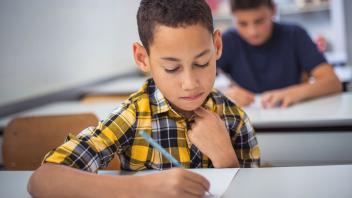How do the realities of our contemporary life mesh with childhood? Have expectations of what a young child should know changed so much that they’re not able to be young? What are — or might be — the consequences?
These questions came to me after hearing illustrator/author Henry Cole speak to a group of adults and reading a potent condemnation of educational reform by Carol Burris , an award-winning school administrator. Though from completely different backgrounds, Burris and Cole expressed alarmingly similar concerns.
Cole identified particular childhood recollections and experiences as influences on his work. Parts and pieces of his childhood and teaching experiences as an adult appear in each of his books, from the wordless story of bravery in Unspoken (Scholastic), to the funny alliterative saga of the near-death of an insect in Clara Caterpillar (written by Pamela Edwards; HarperCollins), to the wonder of creating a rich outdoor environment in On Meadowview Street (Greenwillow). Cole pondered aloud what consequences the structured, data-driven world in which today’s children are growing will have on their ability to see the wonders around them and perhaps even approach and solve problems creatively. Interestingly, each of these books has the potential to support the Common Core standards.
Burris’s colleagues at her New York school shared stories of how their young children are being tested in 2nd and 3rd grade This led Burris to the conclusion that the Common Core standards are being “operationalized” to support data driven “reforms.” She contends that in a “data driven, high-stakes learning environment … that the full domain of what should be learned narrows to those items tested.” Although all English language arts skill areas (reading, writing, speaking, listening and collaboration) are listed in the Standards, only reading and writing will be measured. That means test preparation for even the youngest child and Burris says, reformers “see data, not children.”
Though each author differs in background and experience, Burris’s and Cole’s expressed concerns are quite similar. Children are not being given the chance to explore, to enjoy, and to follow their innate curiosity and thirst for learning.
After all, Burris says, “Real learning occurs in the mind of the learner when she makes connections with prior learning, makes meaning, and retains that knowledge in order to create additional meaning from new information. In short, with tests we see traces of learning, not learning itself.”

